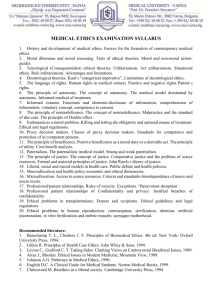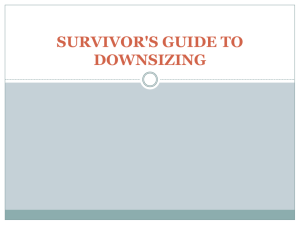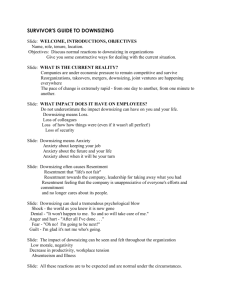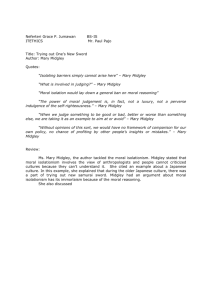Business ethics - St. Francis Xavier University
advertisement
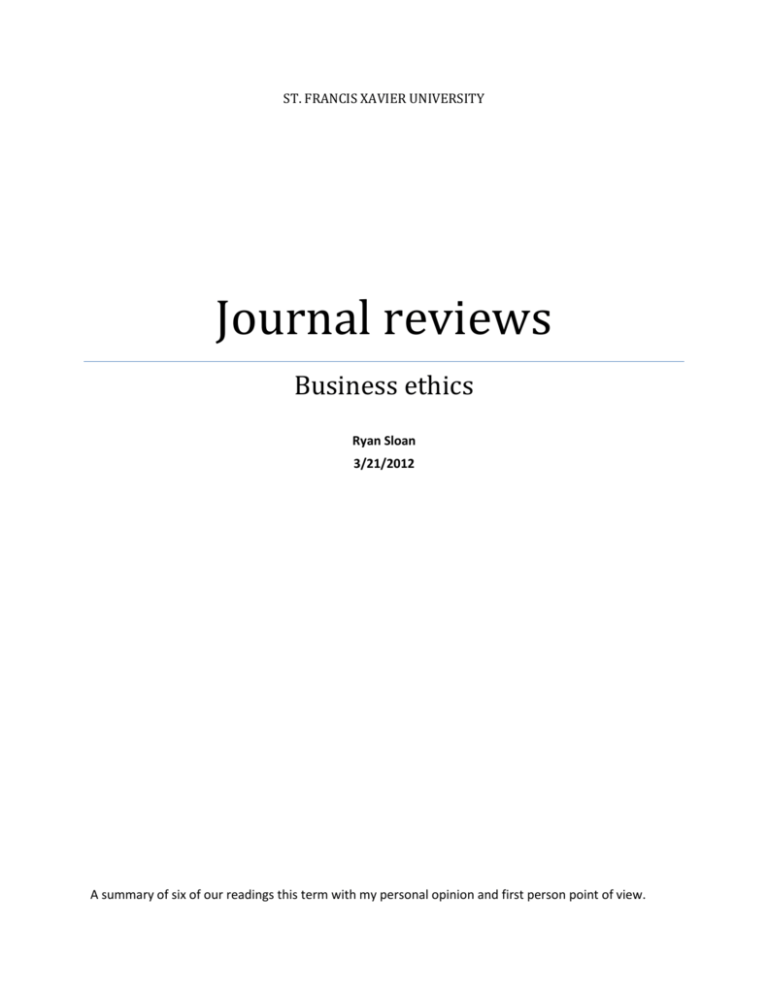
ST. FRANCIS XAVIER UNIVERSITY Journal reviews Business ethics Ryan Sloan 3/21/2012 A summary of six of our readings this term with my personal opinion and first person point of view. Business ethics: Reflective Journals Midgley pg. 413-416 In this article I found that Midgley did an excellent job of outlining moral isolationism and how it really doesn’t make any sense. As I continued to read his article I became aware that I personally do the same thing. Why should I be critical about another culture if I know nothing about their customs and traditions? In the same sense he clearly pointed out that if we aren’t able to be critical about these people, than in contrast we have no right to praise them either. This was really an eye opener to me because it makes complete sense, but people don’t usually think that positive associations may also be taken in the wrong context due to lack of knowledge about that culture. I believe Midgley did a good job in pointing out that there is a lot about our own culture that we do not understand so ultimately “moral isolationism would lay down a general ban on moral reasoning”. By framing the idea that we will inevitability judge something to be good or bad builds an understanding on how to make profit based on these comparisons to our own cultures. As in the samurai case we are more accepting when we learn that there is consent between the passerby and the sword tester, because it relates closer to our customs and traditions. What I have learned from this article is that we learn through experience with other cultures and through comparison with our own cultural traditions to make decisions about what is right or wrong in different parts of the world. I think Midgely does an excellent job of outlining the reasons of how moral isolationism is impossible because of the way humans naturally interact with one another. Introduction to Ethical Theory (on reserve) There are many different types of ethical theories with egoism, relativism, and intuitionism all being “dead-end” theories. With each of these no general consensus can be born because our gut feeling is not always right, there can be many variations of what is good or bad in each culture, and from egoism stems things such as selfishness and personal relativism. Utilitarianism was an ethical theory that I somewhat agreed with. It constructs the idea that you need to consider everyone involved and that the idea that pleasure is good and pain is bad. One issue I had with this is how do we know where to draw the line? Who decides what is pleasurable and what is painful. Utilitarianism tries to draw the greatest good for the maximum number of people. Mill pointed out to me that intellectual pleasures are more beneficial than physical pleasures. How can this utility be quantified? Each person may have a different opinion on what is intellectually pleasurable and some people may find certain things more or less pleasurable than others. The Cost benefit analysis to me seems useless to anyone besides the company because they are usually focused towards them. It also measures things in dollars and not in hedons which is now attaching monetary value to things that make things more quantifiable. A downfall to the cost-benefit analysis that there is an emphasis on short – term consequences, if there is a problem for the future it is not considered and can be missed. Cost benefit analysis are focused around the company and that is why I believe that the answer is not always the morally right one, but the one that is strategically right. Where do we decide to stop quantifying the values of people and which people’s utility are we actually quantifying. Kantian ethics or the deontological ethical theory is one that I am most interested in. It considers not the consequences but the intent “acts done with the right intent are the right acts”. Kant says that there is the principle of universality and I agree with him when he says that whatever principle we can imagine everyone following without impossibility or inconsistency is the right one. Respect for example is a universal principle. I like how he forms the idea that consequences are not always in our control. I agree with Kant that most humans are rational beings with free will, so respect for persons means a respect for their autonomy. I understand that people have unique interests and the principle of universality helps to see that there are beliefs that are transitional across the world. The principle of virtue in virtual ethics by Aristotle is all about what is the right kind of person to be? But a problem I see in this is the grey area in knowing what a virtuous act is or not. Virtues are dependent on the cultures involved so what traits are different or the same, and which are right? I believe the principles of care and compassion are virtues that are universal. Humans are social beings and I think the obligation of care is derived from these traits. Caring for someone is morally right when cared-for is in the picture. The principle of Rights is a very important theory as well because as human beings we are entitled to certain rights and it is wrong to violate those rights. One thing which I find interesting about the principle of rights is that moral rightness is independent of legal rightness. A human right leads to the obligation of someone to either act or not act, creating a moral principle. One important thing I learned from this reading was that moral rights, privileges and rights granted by law are a lot of the time confused and it is important to keep them straight. The principle of Justice States whatever is fair is right. There are three different types of justice distributive, retributive and compensatory. How the goods are divided is the most important. But how do we decide what is fair. Is it through people’s effort, merit, or contribution? Or should everybody get an equal share. In my opinion it should be a combination of the egalitarian theory where the better you do the more you deserve (contribution). The principle of universality, the principle of rights, and the principle of justice are all important factors in determining ethical decisions. No one theory clearly outlines what is right or wrong, but it is the combination of these theories, and knowledge from gaining experience that helps us to make the correct decisions. Adam Smith Pg 167-169 The propensity to barter, truck and exchange one thing for another is common in all men. Men have come down to the theory that is basically “give me what I want, and you get what you want”. The concept is on the division of labor, and this creates markets, each contributing in their own way. One thing I learned from smith is that the difference in natural talents in not as great as we thought and it seems to arise from habit rather than nature. This can be related to how the division of labor works in a society. Talents get noticed at a young age and widen by degrees as they age and continue so unregulated markets can produce greater benefits through the invisible hand of competition. Some concerns that I learned about the free market include the growing gap between the rich and the poor. The rich are getting richer and the poor are getting poorer without restrictions certain people have advantages that allow them to distance themselves from the pack. Power can be exerted from people in higher statuses and wages can be driven lower. An interesting perspective to look at it is that without the ability to truck, barter and exchange every man must have got every convenience in life by himself, and this is simply just not the case. I think it is a necessary factor especially in today’s interconnecting world to be able to trade truck or barter in order to receive certain benefits. This article has taught me when I am in a business I will have to be smart about who and what I trade and to hope that restrictions are put into place so nobody has an advantage The Irresponsible Enterprise: The Ethics of Corporate Downsizing I decided to choose this article as a journal firstly, because it is your work, and secondly because downsizing is something that occurs frequently in the business world. Downsizing as I learned is the restructuring of the company done by profitable companies that result in the significant reduction in the size of the workforce within the community. Other words that describe the practice of downsizing are reengineering, lean, rightsizing, restructuring, leveling or retooling. I think these are all just fancy words that attempt to diffuse the panic that comes with the term downsizing. One thing I do not understand about the commonality of downsizing is that it is usually not beneficial in the long run. It helps with profitability but does not have a play in productivity which I think is an extremely important factor. It is a reactive short-term plan and is not strategic. I wonder to myself how morally correct is it to let someone know that they will have no income that may persist for many years. In communities where downsizing occurs at a company that provides many jobs; crime, abuse, and addiction can all increase. The agency theory states that managers are agents of the company owners and have a responsibility to serve their interests. I do not agree with this theory. The managers do have some responsibility to their owners, but, they also have a responsibility to their employees as well as the surrounding community. Sagoff 459-465 What Sagoff is discussing in his article is that value is made through the willingness to pay. If people want something bad enough than they will pay for it and more people want it, the more value it has. I don’t believe this is fair because you are automatically creating an advantage for people that have money. Everything that is important to people may be considered more valuable making it harder for the lower class to attain these things. An issue that arises in the text is that environmental degradation is a price of economic progress. A business can justify polluting if it would cost more to stop than the value they receive by doing it. I think this is a very selfish and capitalistic way to act. The companies in reality is thinking of nobody but themselves, and are willing to destroy the communities and earth around them to make a quick dollar. Economic approaches to environmental problems use the cost/benefit analysis where human values can be priced. One thing I find hard to understand is how they quantify the value of nature, health. It just does not seem practical to me. The Tragedy of the Commons is an effect of the cost/benefit analysis of using common land. It makes more sense to use the resources of a shared land before you use your own resources so you can save some money. Though this creates a problem because everybody is going to want to do the same thing meaning the resources from that land will be depleted or destroyed. I do not like the idea of the tragedy of the commons and believe there must be a more efficient way to use these resources. A market solution would make it private ownership and could work because a community is based on shared interests. Superson pg. 11-14 The Right to Know Workplace safety is an issue in today’s society especially with so many liability and insurance issues. 14, 000 people are killed every year as a result of accidents on the job. What Superson is trying to say is that the employees “right to know” about health and safety hazards should be established. I think this is one argument I agree with. If you want to run a successful business than the people that are working for you have to feel safe going to work every day. You will run a more efficient and productive business if your employees feel comfortable. The medical world has gained much more in this area than the business workplace has. Many times what happens in the workplace is employer and employee does not have a fiduciary relationship because they may not know each other on a personal level. I don’t agree with this statement that the right to know is not grounded because they may not have a fiduciary relationship. It is still the duty of the employer to make sure that the people keeping his business running are able to come to work every day without the worry of getting ill or injured on the job. An employer uses and employee as a means to his own ends. Ignoring the right to know such as autonomy and fairness of contract violates one of the fundamental economic bases of the free market system. In my opinion, for people to make clear concise decisions they need to know all the information that is available to them. Workplace safety is huge today and contracts as well as relationships can help to reduce the lack of communication. I don’t think that the relationship between employer and employee only has to be a one way street. They can work together and help each other and the company to reach goals together. But this can only be done if the employees are fully informed and kept aware about safety hazards in their workplace. They have to feel secure.







